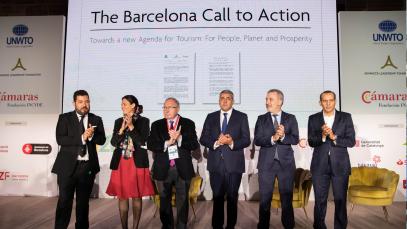Tourism has united around a common Call to Action, outlining a shared vision for the sustainable and inclusive future of the sector. On the second day of the Future of Tourism World Summit in Barcelona (26-27 October), UNWTO was joined by fellow UN agencies, government Ministers, and public and private sector leaders, in agreeing to seize the opportunity to restart and recover better from the impacts of the pandemic. The Call to Action brings together the solutions and plans put forward during the two-day summit, recognizing the importance of transforming tourism ‘for people, for planet and for prosperity’.
‘Tourism must lead the way’
As world leaders get ready to meet in Glasgow for the UN Climate Change Conference (COP26), it states that “tourism must lead the way in adapting, becoming more sustainable and transitioning towards net-zero growth”. Among the key players backing the plan are UNWTO’s fellow the United Nations Conference on Trade and Development (UNCTAD) and the International Civil Aviation Organization (ICAO), along with leading businesses, destinations and governments.
UNWTO Secretary-General Zurab Pololikashvili underscored the need for “clear leadership to secure the financing necessary to build a more sustainable future”. He added that “the Barcelona Call to Action signals our sector’s readiness to lead the way, face up to and overcome challenges and build a better tourism for all”.
SDGs as reference for growth
The Call to Action was announced at the close of the two-day summit. Organized by the Advanced Leadership Foundation, and the Incyde Foundation of the Chambers of Commerce of Spain, with the support of UNWTO, this was the first major event focused on looking ahead held since the start of the pandemic. Its focus aligned with many of the key priorities of UNWTO’s work, most notably an emphasis on securing more and more effective funding to help transform the sector, as well as on the importance of innovation and entrepreneurship.
The ten-point Call to Action includes a commitment to more fully integrating tourism into national and local action plans, ensuring the sector is engaged in issues such as housing, the use of public space and the use of infrastructure. It also highlights the need to ensure the sector’s restart and future growth adhere to the principles of the UNWTO Global Code of Ethics for Tourism and are aligned with the ambitions of the Sustainable Development Goals (SDGs).






0 Comments